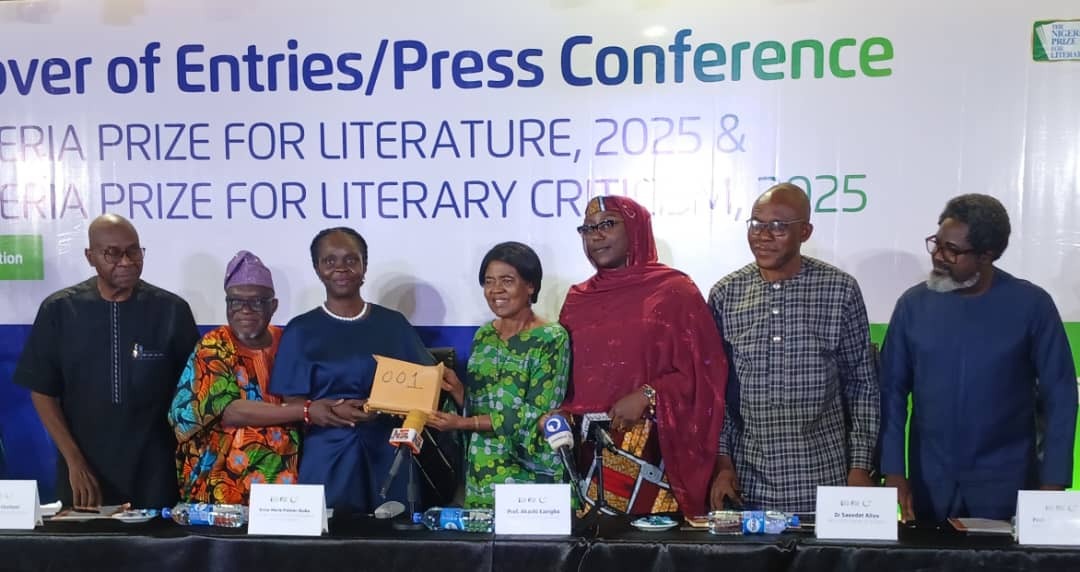The stage is set and as it stands, one out of the overwhelming 252 entries received for the 2025 Nigeria Prize For Literature will, expectedly, emerge victorious come October this year.
The record-breaking entries received for this year’s edition was announced by the Advisory Board of The Nigeria Prize for Literature, sponsored by NLNG, on Tuesday during a Handover ceremony held in Lagos. The 252 entries are an impressive increase from the 2024 figure of 163, as well as the 2021 Prose Fiction cycle, which saw 202 submissions. These record-breaking submissions have set a new level for the quality of entries, promising to be the fiercest competition in the Prize’s history.
The Nigeria Prize for Literature continues to set the standard for literary excellence. The 2025 edition focuses on prose fiction and as usual, comes with a cash award of US$100,000.
The Prize, regarded as Africa’s most prestigious literary prize, and one of the richest globally, rotates annually across four literary genres: Prose Fiction, Poetry, Drama, and Children’s Literature.
During the press conference, NLNG’s General Manager for External Relations and Sustainable Development, Sophia Horsfall, represented by Manager, Corporate Communication and Public Affairs, Anne-Marie Palmer-Ikuku, handed over the entries to the Prize’s Advisory Board, led by the literary icon and past winner, Professor Akachi Adimora-Ezeigbo.
The entries were subsequently presented to the panel of judges, chaired by Professor Saeedat Bolajoko Aliyu of the Department of English and Linguistics Studies, Kwara State University. This officially marked the start of what promises to be an intense and highly competitive adjudication process.
Speaking at the handover ceremony, Horsfall attributed the high number of entries to “a surge in literary creativity, demonstrating a reinvigorated passion for creative works and a deepened global awareness of Nigerian literature.”
Her words, “Year on year, this event validates the Nigeria Prize for Literature and the Nigeria Prize for Literary Criticism. The evidence is in the number of entries that we receive for these prizes every year. In the past 20 years, the Nigerian prize for Literature has enriched our society by nurturing a culture of literary excellence fostering creativity and amplifying the voices of Nigerian writers on the global stage. Through this literature prize, we have witnessed the transformative power of storytelling in shaping perspectives, preserving our cultural heritage and inspiring future generations.
“The US$100,000 literature prize is notably one of the most prestigious literary prizes in Africa, while the Nigeria Prize for Literary Criticism valued at US$10,000 strengthens our commitment to literary excellence. These prizes not only celebrate outstanding literary craftsmanship, but they also shine a global spotlight for them.
“This year’s cycle of the Nigeria Prize for Literature is dedicated to prose fiction and it marks an extraordinary milestone in the history of the prize. We recorded an overwhelming 252 entries, surpassing the 2021 edition of 202 entries.”
According to her, “This year’s record entries reaffirm the prize’s impact, proving that Nigerian literature is not only thriving but also commanding greater international recognition.
“Today’s handover ceremony is a proof of the ingenuity, dedication, and relentless drive of NLNG, our respected advisory boards and judges, and every writer who has entered either for the Literature prize or the Literary Criticism prize. Our commitment to advancing excellence in the quality of literature to improve reading and literacy appetite through these noble prizes is in consonance with NLNG’s aspiration of improving lives sustainably.”
The handover ceremony sets the stage for the longlist of 11, the announcement of the shortlist of three, and the eventual outcome of the 2025 edition of the prizes.
Also speaking, Chairperson of the Advisory Board, Professor Adimora-Ezeigbo, expressed optimism that the caliber and volume of entries submitted this year would significantly elevate the quality of the competition. She noted that the remarkable diversity and depth of literary works would not only make the adjudication process more compelling, but also reaffirm the prize’s unwavering commitment to literary excellence.
“We are confident that this year’s adjudication will be as good, if not better than the ones in the past. We thank NLNG for what it’s been doing for Nigerian educators and the Nigerian educational system. Of course, we know that they are also doing great for science.
“This is a prize that has empowered many writers and promoted Nigerian literature. It has developed the book chain in Nigeria. Now people are very conscious of how they publish. Publishers are very conscious of how they publish; they don’t just print books. Now we are producing books that are properly edited. Writers are writing carefully because many of them want to submit their work for the prize,” she said.
She then urged the panel of judges to approach the process with the highest standards of integrity and objectivity, upholding the legacy of rigour and distinction that has become the hallmark of the Prize, adding that the Advisory Board is fully engaged and anticipates every stage of the selection process with enthusiasm, as this edition may prove to be one of the most competitive in the history of the Prize.
The Advisory Board also announced the receipt of 37 entries for The Nigeria Prize for Literary Criticism. The Literary Criticism Prize winner will receive $10,000.
Other members of the panel include Professor Stephen Mbanefo Ogene, Professor of English Language and Literature at
Nnamdi Azikiwe University, Awka, and Mr Olakunle Kasumu, writer, filmmaker, producer, and host of Channels Television’s Book Club.
Dr Grace Musila, an Associate Professor in the Department of African Literature at the University of the Witwatersrand, Johannesburg, South Africa, serves as the International Consultant for this year’s edition.
Notable past winners in the Prose Fiction category include Kaine Agary (Yellow Yellow, 2008), Chika Unigwe (On Black Sisters’ Street, 2012), Abubakar Adam Ibrahim (Season of Crimson Blossoms, 2016), and Professor Cheluchi Onyemelukwe-Onuobia, whose novel The Son of the House clinched the Prize in the 2020/21 edition. The inaugural edition of the Prize for Prose Fiction in 2004 did not produce a winner.

Leave a Reply